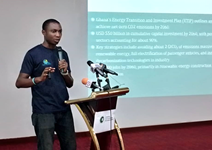By Kizito CUDJOE
Ghana’s youth risk being sidelined in the country’s clean energy agenda despite an ambitious target to reach net-zero emissions by 2060, a coalition of youth groups has said, urging authorities to broaden inclusion in the country’s energy transition framework.
The coalition, made up of the Strategic Youth Network for Development (SYND) and Youth in Natural Resources and Environmental Governance (Youth-NREG) Platform, said Ghana’s main policy roadmaps – the Ghana Energy Transition Framework and Ghana Energy Transition & Investment Plan (GETIP) – offer limited roles for young people.
National Coordinator of the Youth-NREG Platform, Justina Amoah said: “The youth’s active participation is critical to ensuring a just, inclusive and sustainable (energy) transition”.
She noted that the shift to renewable energy presents immense opportunities for job creation, green entrepreneurship and skills development.
“With 73.5 percent of the Ghanaian population under the age of 36 and 38.2 percent in their prime working years (15-35 years), it is important that youths are at the heart of Ghana’s Energy Transition efforts,” she stated.
The groups warned that failing to integrate youth meaningfully into transition planning could widen existing inequities, especially in resource-dependent communities vulnerable to climate impacts.
While GETIP estimates the creation of about 400,000 additional jobs by 2060 in sectors like renewable energy, energy efficiency and sustainable transport, youth leaders argue these opportunities may remain out of reach unless targetted policies are introduced.
Justina Amoah urged that: “To fully seize these opportunities, young people must work together with government, private sector, civil society and development partners to equip them with the necessary skills, resources and platforms to contribute meaningfully in Ghana’s clean energy future”.
A recent youth-led assessment found that 93 percent of young people expressed interest in clean energy entrepreneurship, yet 86 percent cited lack of funding as a major barrier.
The report called for a clean energy skills development programme, expanded vocational training and establishment of a Youth Clean Energy Entrepreneurship Fund to unlock innovation and job creation.
With over 70 percent of Ghana’s population under the age of 36, the coalition maintained that their full participation is not only a demographic imperative but key to a just and inclusive transition.
During a press conference in Accra, they also demanded that government ensures financial barriers do not stifle youth-led innovation.
The call for youth empowerment was echoed by other voices within the coalition.
The Focal Point, Energy Transition & National Organiser, Ghana Energy Transition Consortium for SYND, Gloria Kafui Kuzo said: “Achieving a sustainable and inclusive energy future requires active youth participation, innovation and leadership.”
Recognising the vital role of Ghanaian youth in advancing clean energy solutions, she said SYND advocates for intentional and urgent efforts to integrate young people into the country’s energy transition agenda.
Beyond GHETI and GETIP actions, the coalition urged youth involvement in shaping national policies. These include the development, implementation and review of laws and strategies tied to the energy transition.
This includes the National Energy Policy, Renewable Energy Act, National Climate Change Policy, Sustainable Energy for All Action Plan, Ghana Integrated Power Sector Master Plan, Gas Master Plan, Ghana Trade Policy and National Infrastructure Plan, among others.
“This recommendation is to help ensure youth inclusion in the energy transition process – in line with the National Youth Policy (2022 – 2032).”
They recognise that the rush for critical or green minerals in the throes of energy transition, if not well-managed, can lead to severe unintended consequences against young people.
“We therefore call on policymakers, industry players, development partners and civil society organisations to prioritise youth integration in Ghana’s energy transition efforts. By empowering young people today, we secure a sustainable energy future for generations to come.”










